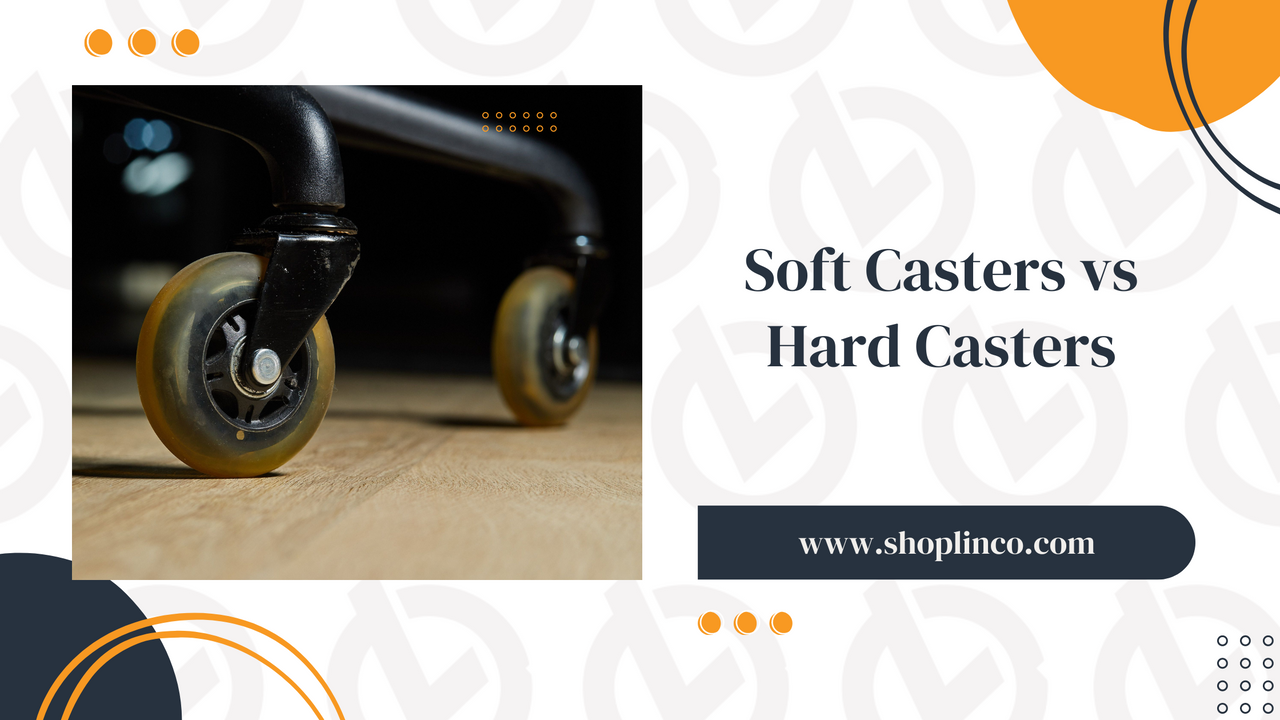Caster wheels are made in a wide variety of materials and specifications, such as wheel diameter, caster design, and tread widths. All of these result in different types of casters.
Each type of caster has their own advantages, disadvantages, and optimal or recommended use. As such, choosing the right type of caster wheel can be crucial for a specific application. Determining the best casters that fit your needs requires an understanding of different caster types and when or how to use them effectively and efficiently.
When considering floor surfaces, there are two types of casters to choose from: soft casters and hard casters.
What Are Soft Casters?
Soft casters are casters with wheels made from softer materials, such as rubber or plastic. These are also called soft tread casters, since they have soft or cushioned treads covering the wheel, similar to the wheels of a car.
The wheel materials are often made from rubber, plastic, polyurethane, or nylon. Take note that the word “soft” refers to the caster wheel material itself, rather than the floor material.
Advantages of Soft Casters
The softer treads give the casters additional traction, allowing it to roll better compared to hard casters. The slight cushion allows the casters to absorb some of the weight, resulting in greater ease in maneuvering the equipment.
Softer materials give the casters higher rolling resistance. It takes more initial force to get the casters in motion, as well as to keep them moving at a constant speed. This can be slightly beneficial when transporting loads, as it can potentially prevent runaway dollies or trolleys.
Additionally, softer wheel materials transmit less vibration than hard casters, which means less shaking. This makes soft casters ideal for quiet environments as well. Aside from the smoother ride, rubber or another softer material wheel cover also helps avoid floor damage.
Overall, soft casters offer the following benefits:
- Cushioned rides
- Versatility in handling light and heavy load capacity
- Minimal floor markings
- Less vibrations
- Quieter sound when rolling
What Are Hard Casters?
As the name implies, hard casters are casters whose wheels are made from harder materials. Although the most common examples are cast iron and stainless steel casters, these types of casters can also have coverings or wheel treads.
Hard casters can still be made with polyurethane, thermoplastic, nylon, or polyolefin wheels. The only difference is that they are constructed to be much more rigid or solid compared to soft casters.
Advantages of Hard Casters
Hard tread casters are generally more durable than soft casters. These types of casters can also take on greater load capacities.
Additionally, hard casters have lower starting and rolling resistance. This means it takes much less force to get the casters moving, as well as to maintain a constant speed.
One of the few downsides to hard casters is the noise. Since it lacks a softer cushion or padding, rolling hard caster wheels on hard floors can result in a lot of noise.
In summary, the benefits of hard casters include:
- Low starting and rolling resistance
- Wheel treads maintain shape longer
- Higher durability
- Longer lifespan
- Ideal for carrying high capacity loads
How To Choose Between Soft Casters vs Hard Casters
In general, the choice between soft casters vs. hard casters is an easy one. The key is to know what type of surfaces the casters will be used on.
Soft casters are best suited for harder surfaces. These include hardwood floors, marble, tiles, and concrete floors common in industrial warehouses. Some great soft casters available on the LINCO website are:
- Linco 6” Heavy Duty Locking Caster Wheels
- Linco 4” Heavy Duty Casters, Set of 4 Thermoplastic Rubber Caster Wheels
- Blickle 8″ Swivel Caster with Leading Brake & Blickle Soft Rubber Wheel
Meanwhile, hard casters are generally best suited for softer surfaces, such as carpeted offices and dirt. Highly recommended hard casters on our website include:
- Linco 2” Heavy Duty Swivel Office Chair Caster
- LINCO Locking Cast Iron Swivel Caster 5″
- Colson Polyurethane Total Lock Swivel Caster 5″
For bulk orders, product inquiries, or additional assistance in choosing the best type of casters, call LINCO at 866-306-9566 or send us a message on our Contact Page.

